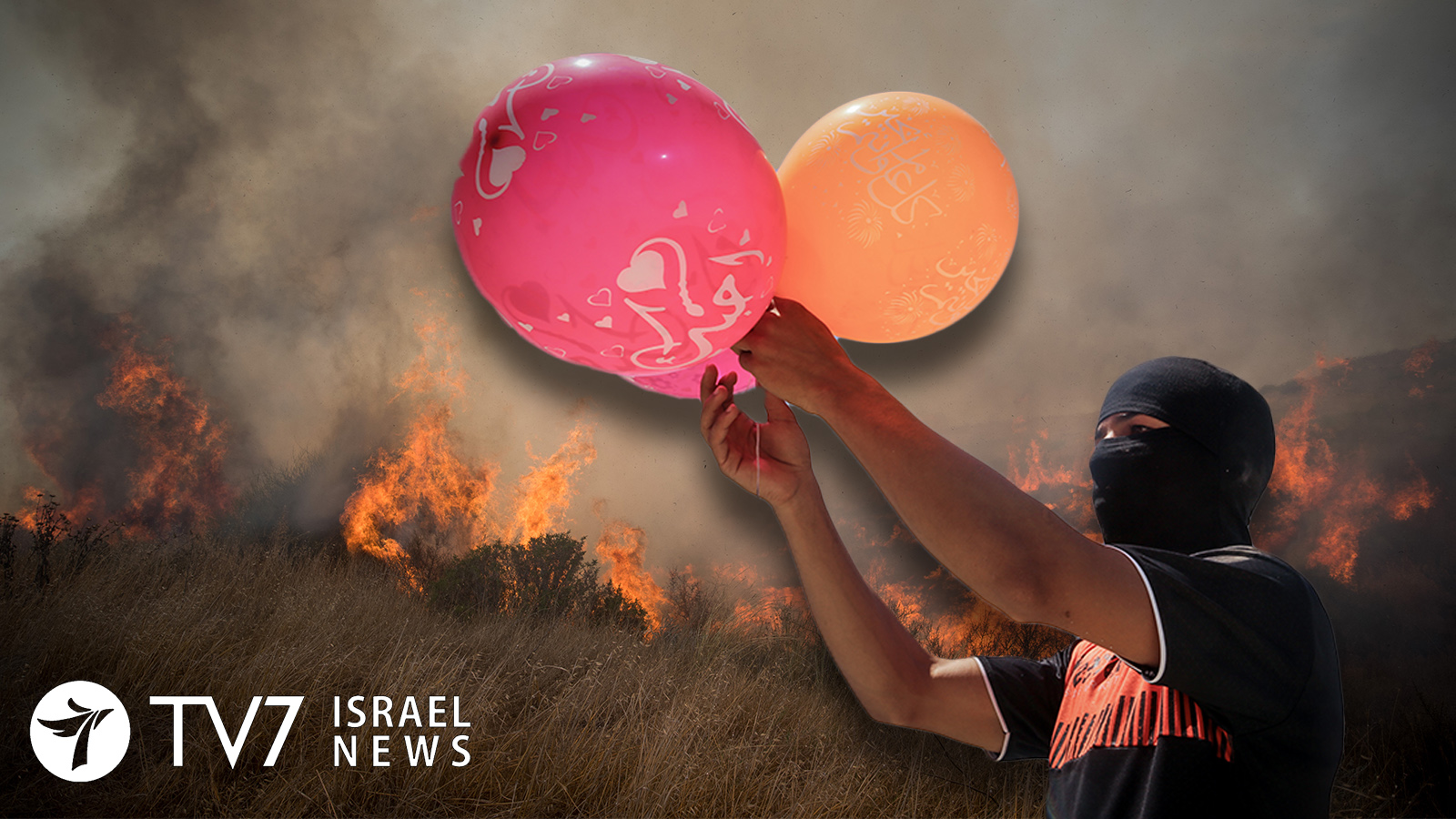Palestinian Islamists unleashed a number of improvised explosive and incendiary devices attached to clusters of balloons over the weekend toward Israeli territory, as tensions intensify on the southern front with the Hamas-controlled Gaza Strip.
Many of the firebombs exploded mid-air, while others detonated in uninhabited areas. There were no reported injuries from the attacks, although two fires broke out in the vicinity of the Israeli civilian community of Be’eri in the Eshkol Regional Council, adjacent to the border with the Palestinian enclave.
In a separate incident, the IDF informed TV7 that shots were fired from the southern part of the Hamas-controlled territory toward IDF troops performing construction work on the security fence between the two sides. The IDF responded by firing smoke-shells in apparent efforts to obscure the attackers’ vision; and no injuries were reported to any of the Israeli soldiers.
In a later retaliatory response last night, “an IDF aircraft struck an observation post belonging to the Hamas terror organization in the northern Gaza Strip.” And while the militant installation was utterly destroyed, there were no reports of any casualties.
Israeli Alternate Premier and Defense Minister Benny Gantz warned the Islamist Hamas organization of the consequences of testing Israel’s determination to protect itself. Speaking at the start of the Knesset Foreign Affairs and Defense Committee this morning, the top Israeli defense official emphasized that while Jerusalem has “zero interests in Gaza beyond complete quiet and security,” that it will act with force to assure that no terror emanates from the Jihadist-plagued territory. “We do not accept rocket fire from there, nor do we accept (incendiary) balloons or any other kind of (terror) operations. We will act, as necessary,” he said.
Despite the clear threat leveled at Hamas, terror balloons rigged with explosives were sent sailing throughout the day from the Palestinian enclave toward Israeli territory. Hamas also fired a barrage of at least four rockets toward the Mediterranean Sea – in what is viewed by Israeli security officials as a signal to Jerusalem. This, over the Islamist group’s sense that Israel is impeding development of large-scale projects to improve the humanitarian situation in Gaza, at a time Hamas is seemingly challenged by both domestic and global challenges.
Hamas relayed a message to Egyptian intelligence warning that the period of relative calm along the Israeli-Gaza border will be ended if Palestinian interests are not preserved.
This threat coincides with the next monthly transfer of aid from Qatar, amid reported Hamas concern that the assistance for Gaza residents and infrastructure projects may not be extended past September. As witnessed in the past, an increase of violence directed at Israel has long been part of Hamas’ campaign to coerce the continued flow of funds.
Meanwhile in other regional developments, Israeli Defense Minister Gantz also emphasized the importance of persevering the international effort to hinder the Islamic Republic’s malign aspirations by all means necessary. “We must act together with the international community to persist exacting a price from Iran, and to influence whatever emanates from Iran. Iran continues to pursue nuclear (weapons), Iran continues to destabilize the reality in our region, it has thousands of proxies which operate in Syria and Lebanon, in Yemen and Africa, it has cells in Europe and elsewhere around the world,” said Gantz, adding, “We cannot and should not ignore this issue. We do not need to ignore its efforts to persist with its nuclear activities, neither to ignore its malign activities across the Middle East. And, indeed, the continues pressure on Iran and the continued (arms) embargo is a very important matter.”
The Defense Minister further underscored the nation’s resolve to thwart Iran’s efforts to establish a “terror base” in Israel’s northern neighbor, Syria. “We need to thwart this additional branch as must as possible. And we are operating in Syria and elsewhere throughout this region, all the time and in a number of methods – and so it should continue,” he said.
In his briefing to Jerusalem’s most-important defense committee, Lt. Gen. (res.) Gantz also stressed that “It is important to remind that we have bitter and resolved rivals throughout this region.” With regard to the Lebanon-based, Iranian proxy Hezbollah headed by Hassan Nasrallah, Gantz said “that while Nasrallah is our greatest enemy to our north, he is the greatest problem of Lebanon within Lebanon itself.” Referencing the “terrible disaster” that occurred during the 4 August explosion at the Beirut Port which claimed the lives of at least 158 people and wounded over 5,000 others, he pointed to Hezbollah’s storage of weapons within civilian structures. “Just think about what would happen if that would be repeated with Iranian weapons in all of the villages and towns throughout Lebanon. This is (literally) what is happening there. I am telling you that in Lebanon you have houses that have a guest room and a missile storage room within the same home – and when this missile will explode, whether on its own or because we are forced to go after it – the guest room will not remain intact, either. As a result, the civilian population in Lebanon will pay a heavy price.”
Defense Minister Gantz also reiterated that “The State of Israel genuinely offered every kind of (humanitarian) assistance” in the aftermath of the devastating explosion.
